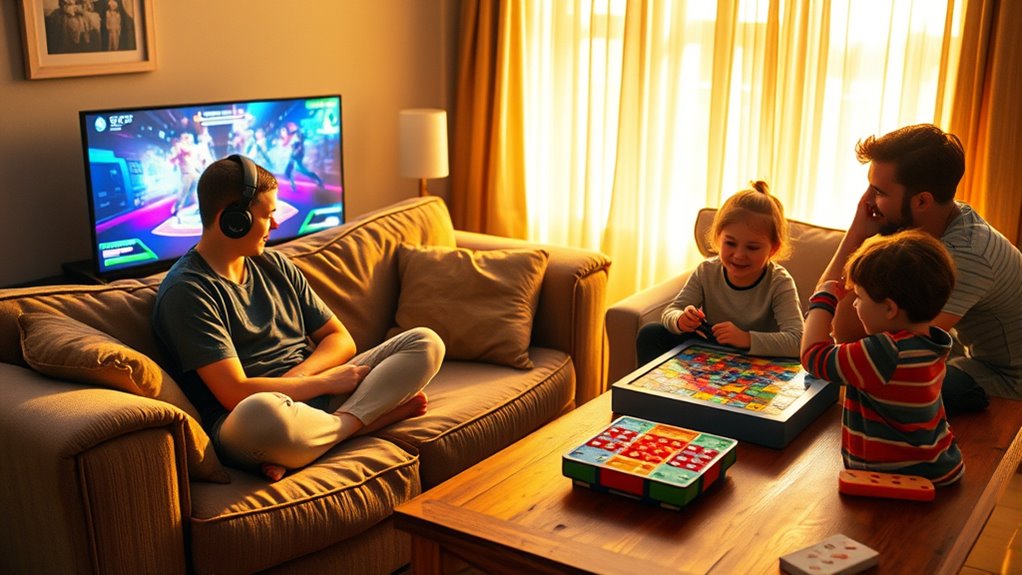To balance gaming with quality time, set clear boundaries and focus on meaningful interactions both online and offline. Avoid letting gaming interfere with responsibilities or relationships by creating designated gaming times and prioritizing face-to-face moments. Incorporate hobbies and activities outside gaming to foster social skills and emotional wellbeing. Staying self-aware helps you recognize when gaming affects your mood or routines. If you want practical tips on maintaining this harmony, discover more ways to find that balance.
Key Takeaways
- Set specific gaming time limits to prevent overuse while leaving room for quality in-person interactions.
- Prioritize meaningful conversations and shared activities over passive gaming sessions.
- Incorporate diverse hobbies and social events to balance digital entertainment with real-world connections.
- Use self-awareness to monitor how gaming impacts mood, routines, and relationships, adjusting habits as needed.
- Practice mindfulness and routine management to maintain emotional health and foster genuine social bonds.

In today’s digital age, gaming can easily become a double-edged sword, offering entertainment and social connection but also risking obsession and neglect of other life aspects. When you immerse yourself into Virtuelle Welten, you get an immersive experience that transports you to fantastical landscapes, intense battles, or complex storylines. These virtual worlds can be incredibly engaging, pulling you in for hours on end. But it’s important to remember that they shouldn’t replace real-life interactions. As you spend more time in these digital spheres, your Soziale Interaktion outside the game might suffer. Face-to-face conversations, spontaneous meetups, and emotional connections with friends and family can fade into the background if gaming becomes your primary social outlet.
Finding a healthy balance means recognizing when gaming starts to encroach on your daily responsibilities or relationships. It’s easy to justify longer gaming sessions because of the thrill of exploration or the camaraderie of online team play, but too much of it can lead to isolation. To avoid this, set clear boundaries. For instance, allocate specific times for gaming and stick to them. When you do interact with others, be fully present—put your device aside and focus on meaningful conversations. Remember, online interactions are valuable, but they shouldn’t replace the richness of real-world connections. Engaging in activities outside gaming—whether sports, hobbies, or social events—can help diversify your experiences and prevent the feeling of loneliness or dependency.
Another key is self-awareness. Keep track of how gaming affects your mood and daily routines. If you notice that your gaming sessions are causing stress, fatigue, or argument with loved ones, it’s a sign to reassess your habits. Don’t view gaming as an all-or-nothing activity; instead, see it as one part of a well-rounded life. Balance involves integrating your digital interests with real-life pursuits, ensuring that your social skills and relationships flourish alongside your gaming passion. Additionally, incorporating practices like meditation can help improve mental clarity and emotional regulation, making it easier to maintain healthy habits. Remember, the goal isn’t to eliminate gaming but to enjoy it responsibly, making sure it enhances rather than detracts from your overall wellbeing. By doing so, you can appreciate the entertainment and social benefits of Virtuelle Welten while maintaining strong, genuine Soziale Interaktion in your everyday life.
Frequently Asked Questions
How Can I Tell if Gaming Is Harming My Mental Health?
If you’re wondering whether gaming is harming your mental health, look for psychological warning signs like increased anxiety, irritability, or difficulty concentrating. Notice how gaming affects your emotional state—are you feeling more lonely, stressed, or overwhelmed? If these impacts persist or worsen, it’s a sign you should balance your gaming habits and seek support. Paying attention to these signs helps you protect your mental well-being without feeling guilty.
What Are Effective Strategies to Limit Gaming Time?
Balancing gaming and other activities might seem tricky, but it’s doable. You can start by practicing effective time management—set specific limits for gaming sessions. Establish clear boundaries, like no screens during meals or an hour before bed. Use alarms or apps to remind you when to stop. These simple strategies help you enjoy gaming without it taking over your life, fostering healthier habits and more quality time.
How Do I Approach a Loved One About Their Gaming Habits?
When approaching a loved one about their gaming habits, you should start with open, honest communication. Be mindful of communication barriers and avoid accusatory language, which can trigger emotional responses. Express your concern calmly, focusing on how their gaming affects your relationship. Listen actively to their perspective, and work together to find a balance that respects both their interests and your need for quality time, without issuing ultimatums.
Are There Recommended Activities to Replace Gaming and Improve Quality Time?
To replace gaming and boost quality time, try suggesting outdoor activities like hiking or cycling, which encourage movement and connection. You can also explore creative hobbies such as painting, cooking, or playing music together. These activities offer engaging alternatives that foster bonding and shared experiences. By introducing varied options, you help your loved one discover new interests without pressure, making quality time enjoyable and meaningful.
What Signs Indicate a Gaming Habit Is Becoming an Addiction?
You might notice signs that your gaming habit is becoming an addiction through changing behavior patterns and emotional cues. If you find yourself unable to stop gaming despite negative consequences, or if you feel anxious or irritable when not playing, these are warning signs. You may also notice neglect of responsibilities or social withdrawal. Recognizing these cues early helps you regain balance without resorting to ultimatums, fostering healthier habits.
Conclusion
Finding harmony between gaming and quality time isn’t about playing hardball or making ultimatums. Instead, you can strike a balance that keeps your passions alive while nurturing your relationships. Remember, it’s not about swinging to extremes but walking the tightrope with purpose. When you prioritize, set boundaries, and stay mindful, you’ll find that both worlds can coexist beautifully. In the end, it’s all about playing your cards right and making the most of your time.









